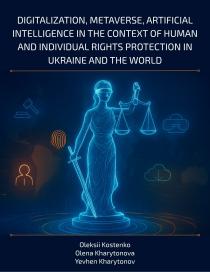ARTIFICIAL INTELLIGENCE AS A LEGAL CATEGORY
Synopsis
The study is devoted to the definition of artificial intelligence as a legal category. At the same time, the peculiarity of the term and its general social significance determine the fact that in order to find an answer to the question of the legal nature of artificial intelligence, it is relevant to analyze not only purely legal scientific ideas, but also philosophical, psychological, social, religious and other aspects of understanding artificial intelligence and the impact of this phenomenon on various spheres of public life.
In order to define the concept of artificial intelligence, the author examined the attempts to define it that have already been used in legislation. In particular, the author analyzed the Artificial Intelligence Act (AI Act), which entered into force in the EU on August 1, 2024, and concluded that this law does not answer the question of the subjectivity or lack thereof of artificial intelligence. Considerable attention is paid to the legal framework of Ukraine, in particular, the Resolution of the Cabinet of Ministers of Ukraine No. 1556-p of December 2, 2020, which approved the Concept of Artificial Intelligence Development in Ukraine. This policy document uses the basic principles of the Guidelines of the Organization for Economic Cooperation and Development (OECD) on Artificial Intelligence (Recommendation of the Council on Artificial Intelligence), which Ukraine joined in 2019.
The definition of artificial intelligence as a legal category in legal doctrine encounters a number of fundamental problems, but they all have a common denominator in identifying the legal nature of the bearers of such intelligence. The analysis of modern legal doctrine has revealed general approaches to understanding the relationship between the use of artificial intelligence and its liability for actions, namely: 1) positioning of robots with artificial intelligence as an object of social relations (under this approach, robots with artificial intelligence are perceived only as possible assistance in social relations where the subjects are individuals and legal entities) 2) positioning of artificial intelligence robots as separate subjects of legal relations (under this approach, artificial intelligence robots are perceived as separate independent subjects of social relations with the ability to realize and assess the significance of their actions and actions of other persons relatively independently and to a sufficient extent).
Based on the study, the author offers her own solution to the problem of determining the legal status of artificial intelligence (robot, intellectual agent). First of all, the author proves the need to gradually prepare the legal system for the emergence of a new subject - an electronic person. It is timely to discuss the practical possibility of granting in the future the status of a quasi-legal entity to the most advanced artificial intelligence systems with a high degree of autonomy, since it does not fall under the category of a legal entity (which is also a fiction).
It is substantiated that electronic persons should be understood as powerful artificial intelligence systems endowed with the status of a "quasi-legal" person having an appropriate scope of special legal capacity depending on their functional purpose and capabilities. The study draws historical and legal parallels with the experience of Ancient Rome in terms of using (involving) phenomena which were not originally subjects of law and then acquired such a possibility (municipalities, institutions, slaves, etc.) to participate in civil circulation.
Recognition of artificial intelligence robots ("electronic persons", "intellectual agents") as a quasi-legal entity will entail a number of additional legal consequences. In particular, there is a need to include "cyber capacity" in the list of types of legal personality of a legal entity, i.e. the ability to be an active participant in relations in the IT sphere (to enter into contracts as a user, to be a member of social networks, to participate in interactive campaigns, etc.) Cyber capacity can be realized through both transactions and legal acts.
As with legal entities, electronic entities should be subject to mandatory state registration in the relevant electronic registers. At the same time, a system of licensing the types of activities of such entities and establishing standards and norms to which such entities must comply, depending on the type of activity, is also possible. In addition to the development of the necessary regulations and standards, it is very important to use soft law. In this case, ethical standards of artificial intelligence are its value basis - they must be observed by all participants in legal relations: both private companies and executive authorities.
The author argues that an electronic person can be defined as a set of technologies which are recognized by law as a participant in property and non-property relations. Such a person has the legal status of a quasi-legal entity, is registered in accordance with the procedure established by law, and has a special legal personality depending on the functional purpose (field of activity).










